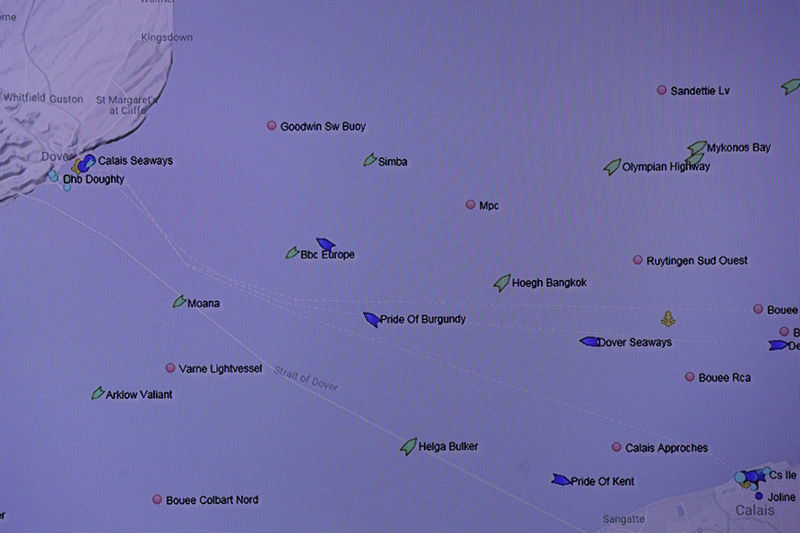By Guy Faulconbridge
DOVER, England (Reuters) - Dover, Europe's busiest ferry port, is as prepared for Brexit as it can be but there are uncertainties over the extent to which freight operators are ready for new declarations and whether France will keep goods moving, the port's chief executive said.
As one of Britain's main arteries for European trade since Roman times, Dover handles 119 billion pounds ($149 billion) worth of trade, or 17 percent of the country's commerce in goods each year, making it a potential Brexit pressure point.
"The port of Dover is fully ready for Brexit," CEO Doug Bannister told Reuters from the control tower overlooking the port, where a gale was buffeting hundreds of lorries from Europe motoring towards the British road system.
"Now what we are saying by fully ready is: we are not guaranteeing that there is going to be no disruption or congestion because clearly under a no-deal Brexit there would be, but what we are saying is: we are ready to handle that."
A divorce deal to smooth Britain's exit, set for Oct. 31, hung in the balance on Monday as the EU sought more concessions from London. Prime Minister Boris Johnson has said Britain will leave without a deal if the EU refuses him one at a summit on Thursday and Friday, though parliament has passed a law ordering him in that case to seek an extension.
A "no-deal" divorce could disrupt trade between the world's fifth largest economy and the world's biggest trading bloc, dislocating supply chains, cutting food imports and turning southern England and northern France into giant lorry parks as congestion brings traffic in Dover and Calais to a standstill.
France has been testing ways to deal with any disruption, including customs declarations done far from the port to reduce congestion.
French customs officials have said a computerized "smart border" and 500 extra customs agents will be ready on Day 1 of Brexit, but have said they are not allowed to coordinate planning directly with their British counterparts while Brexit negotiations are ongoing.
So when will the trouble hit - if it does?
Bannister, who has warned that a 2-minute delay at Dover could lead to a 17-mile queue of lorries in Kent, said he expected lower traffic volumes in the first days after Brexit, especially with France celebrating All Saints' Day on Nov. 1.
"If it begins to bite in that second week we will begin to feel it fast," he said. "I expect that on Nov. 1 it will be okay and that is primarily due to it being a low traffic day."
BREXIT RULES?
While Dover's famous White Cliffs are just 33 km (21 miles) from France, the port has held immense symbolic, strategic and military significance for centuries as the key to the kingdom.
The Norman Castle which sits atop the cliffs may lie upon a much older Iron Age fort, while in the Cold War, the tunnels deep beneath the castle were designated as a regional power center should London be destroyed by a Soviet nuclear attack.
Bannister said one of the problems is that no-one actually knows on what terms the United Kingdom will be trading after Brexit.
"If there is a deal, it depends what the nature of the deal is. One of the challenges that we have is that we don’t yet know what the rules of the game are going to be," he said. "Right now all we can plan on is a no-deal Brexit scenario."
British government no-deal planning documents from August, known as Operation Yellowhammer, said 50-85% of lorries might not be ready for French customs, reducing the flow rate to 40-60% of current levels within one day.
"That is a pessimistic outlook," Bannister. "What I am anticipating is that there will be more border-ready vehicles by the time they get to the border."
On motorways across the United Kingdom, signs warn: "Freight to EU - papers may change 1 Nov. Please check."
Other uncertainties are what happens on the British road system - whether it clogs up - and what happens on the EU border in Calais.
Bannister said the size of trade with the EU meant that any delays would hurt both sides.
"Government here in the UK has been very clear and very firm that there will be no incremental checks at the border so traffic will continue to flow - we have not had the same level of assurance from the French authorities," he said.

($1 = 0.7977 pounds)